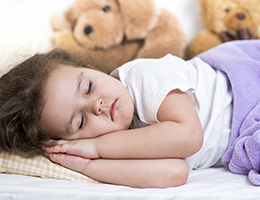
Ghoulies and ghosties and long-leggedy beasties have long fed our desire to be scared out of our wits. We seek them out in movies, in books and in stories told around the campfire.
But for kids, things that go bump in the night can be the stuff of nightmares—bad dreams that may wake a child from sleep and leave them crying out for mom and dad.
Night terrors can make a child cry out too, but they aren't bad dreams. Night terrors are sleep disturbances that can be more frightening for the parents than for the child. They're less common than nightmares.
Either of these events can disrupt the sleep of everyone in your house.
But in most cases, neither one needs professional treatment. All you'll likely need is a little patience, some reassuring words and the knowledge that both usually go away with time.
Night terrors
Night terrors may cause parents more concern than nightmares. After all, most people have had nightmares at some time in their lives.
But night terrors are relatively rare, according to the American Academy of Child and Adolescent Psychiatry.
They also tend to be dramatic events, which can be quite distressing to parents.
Terrors usually occur early in the night, sometimes before parents have gone to bed. They may include such symptoms as:
- Screaming, kicking and thrashing in the bed.
- Sweating and gasping, eyes wide open with fear.
- Shaking and uncontrolled crying.
The child won't respond to a parent's presence or questions. The child might even fight any attempts at restraint.
Although most night terrors are over fairly quickly, they can last as long as 45 minutes, according to the American Academy of Pediatrics (AAP). When the night terror ends, the child falls back to sleep.
The next day, the child will have no memory of the event. Parents, on the other hand, might feel frazzled—especially if the terrors recur.
No one knows for sure what causes night terrors, although they seem to run in families. Fatigue can be a contributing factor, according to the American Academy of Family Physicians.
Nightmares
Most kids have nightmares from time to time.
Unlike night terrors, nightmares tend to occur later in the night. Kids often remember them.
Nightmares can be caused by:
- Stress and anxiety.
- Big events, such as moving to a new home or new school.
- Scary stories or TV shows.
What a parent can do
When your child wakes up from a nightmare: Go to them as soon as you can. Tell your child that dreams can't hurt them and that you are there to protect them from any harm.
Let your child tell you about the dream. Be supportive. If your child is afraid of a monster, you might help search the bedroom to show that nothing's there.
If the fear persists, let your child leave the light on.
When your child has a night terror: Don't try to wake them up.
Stay calm and talk to your child in a reassuring voice. Don't try to restrain them, except to prevent injury. Stay with your child until the night terror ends.
Since fatigue may be a cause, you might try putting your child to sleep earlier.
Until your child's night terrors go away, be sure any babysitters know about them and know what to do if they occur.
Talk to your doctor
You might want to talk to your doctor if sleep problems begin to affect how you or your child function during the day, according to the AAP.
Reviewed 12/4/2024